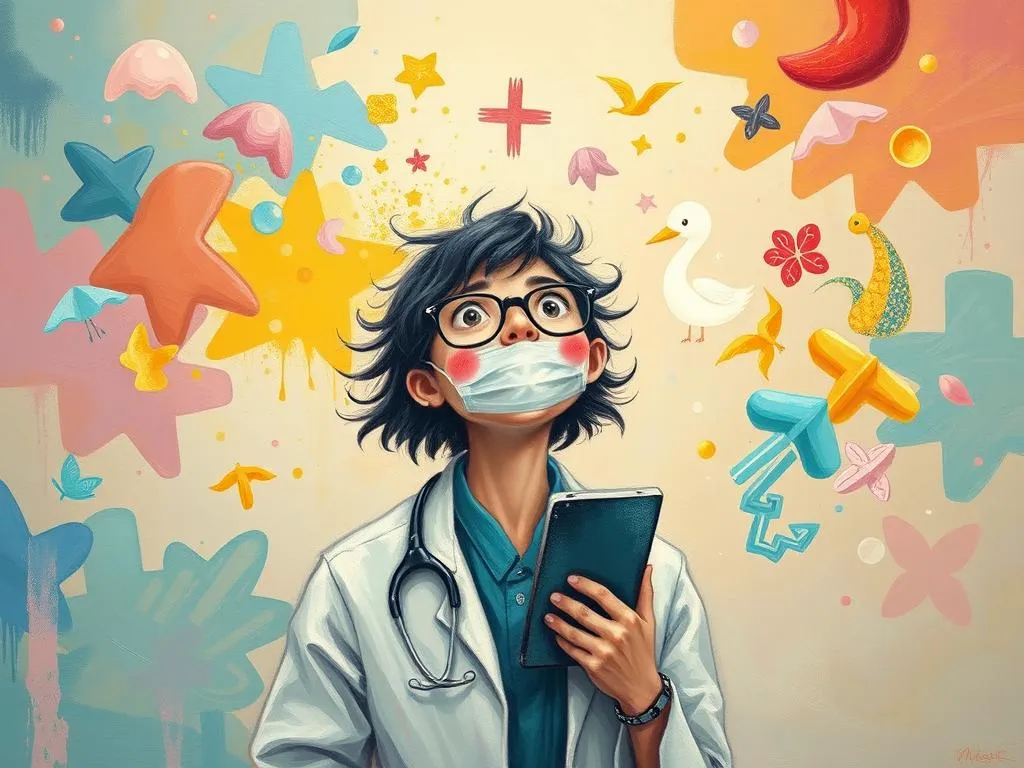
Dreams have long been a source of fascination and intrigue for humanity. They offer a glimpse into our subconscious, revealing hidden fears, desires, and even the complexities of our daily lives. Among the multitude of dream themes, the experiences of medical students stand out for their unique blend of stress, ambition, and self-discovery. For those who find themselves navigating the rigorous landscape of medical education, dreaming about their journey can be both a reflection of their waking lives and a window into deeper emotional and psychological insights. In this article, we will explore the symbolism behind dreams related to medical students, delving into their meanings, variations, and real-life connections.
Symbolism and Meaning
Dreams about being a medical student often encapsulate a variety of symbolic elements, each with distinct meanings. One of the most prevalent symbols is the classroom or lecture hall. This setting represents not only the pursuit of knowledge but also the pressures and expectations that come with it. If you dream of being in a classroom, it may indicate a desire for understanding, growth, or even a fear of inadequacy regarding your skills and knowledge.
Another common symbol is the patient. In these dreams, the patient may represent unresolved issues or aspects of yourself that require attention. For instance, if you dream about treating a patient, this could signify your drive to help others, reflecting your values and aspirations as a medical student. Alternatively, if the patient is unresponsive or in distress, it may point to feelings of helplessness or anxiety about your ability to succeed in your field.
Exams and assessments are also significant symbols in dreams of medical students. They often embody the pressure of evaluation and the fear of failure. A dream where you are unprepared for an exam could be a manifestation of your anxieties about performance, not just academically, but in life as well. Conversely, passing an exam in a dream might symbolize a sense of achievement or readiness to take on challenges.
The presence of medical equipment in these dreams can further deepen the interpretation. Instruments like stethoscopes or scalpels may signify a need for precision and care in your actions. They can also reflect the tools you feel you need to navigate your career, both literally and metaphorically. In some cases, these tools may represent the emotional or psychological burdens that come with the responsibility of being in the medical field.
Lastly, the mentor or professor figure often appears in these dreams, symbolizing guidance, authority, or the quest for knowledge. This figure can embody both support and pressure, reflecting your relationship with authority figures in your life and your desire for mentorship as you navigate your path.
Key Scenarios and Variations
The context of the dream plays a crucial role in how we interpret its meaning. Different scenarios can significantly alter the emotional landscape and the insights we derive from the experience.
For instance, consider a dream where you are in a chaotic hospital environment, surrounded by patients in need and a team of disorganized colleagues. This scenario could represent feelings of overwhelm and anxiety about your workload or the expectations placed upon you. It may also highlight fears of inadequacy in managing the responsibilities of your future career. In contrast, a dream where you are calmly treating a patient in a well-organized clinic may suggest a sense of control and confidence in your abilities.
Another common variation involves the dreamer being unprepared for a crucial presentation or examination. This scenario typically indicates deeper insecurities and fears about competence and success. The anxiety felt in this dream may mirror real-life concerns about achieving professional milestones. Alternatively, dreaming about successfully presenting a case or performing a procedure with ease can symbolize self-assuredness and readiness for the challenges ahead.
In some dreams, medical students may find themselves in unusual or surreal situations, such as diagnosing a bizarre illness in an alien or performing surgery in an inappropriate setting. Such scenarios may point to feelings of disconnection or absurdity in your current studies or experiences. They can also reflect a need to reassess your goals and motivations, urging you to confront any dissonance between your aspirations and reality.
Moreover, dreams involving collaboration with fellow students can reveal insights about your relationships and teamwork skills. A cooperative experience may symbolize a supportive network and the importance of collaboration in your journey. Conversely, a dream filled with conflict or rivalry among peers could indicate feelings of competition and stress, urging you to reflect on your interpersonal dynamics within your academic environment.
Real-Life Connections and Takeaways
Understanding the symbolism behind these dreams can provide valuable insights into your waking life. It offers an opportunity for self-reflection and personal growth. To connect these dreams to your real-life experiences, consider the following approaches.
First, take time to reflect on your current emotional state. Are you feeling overwhelmed, anxious, or confident in your studies? Journaling about your dreams and their feelings can help you identify patterns and recurring themes that might be influencing your daily life. This practice fosters greater self-awareness and may lead to identifying areas in your life where you need support or change.
Second, consider your relationships with classmates, professors, and mentors. How do these connections affect your experience as a medical student? Reflecting on your interactions can help you understand the social dynamics at play in your academic environment. If dreams reveal feelings of competition or rivalry, it might be beneficial to seek collaborative opportunities or focus on building supportive relationships.
Additionally, think about the pressures you face in your studies and how they manifest in your dreams. Are there specific expectations you feel are unrealistic? Exploring these pressures can empower you to set boundaries and prioritize your well-being. Learning to manage stress through mindfulness techniques or self-care practices can significantly enhance your overall experience.
Lastly, embrace the uncertainty that comes with being a medical student. Dreams often reflect our fears and anxieties, but they can also serve as reminders of the growth opportunities that lie ahead. Acknowledge that it is natural to feel uncertain about your future, and consider focusing on the journey rather than solely the destination. Engaging in activities that remind you of your passion for medicine can reignite your motivation and purpose.
In conclusion, dreams about being a medical student are rich with symbolism and meaning. They reflect the complexities of your emotional landscape, your ambitions, and the challenges that come with your rigorous training. By exploring the symbolism, scenarios, and real-life connections, you can gain deeper insights into your experiences as a medical student. Allow these dreams to guide your self-reflection and encourage personal growth as you navigate your educational journey. Remember, your dreams are not just fleeting images—they are a powerful tool for understanding yourself.







